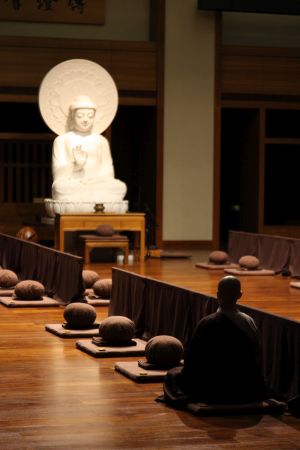Chan Meditation Roadmap
Our Style of Retreats

Noble Silence
Intensive and Non-Intensive
Our intensive retreats follow the traditional Chan monastery retreat schedule, starting early in the morning and making the most efficient use of time in group practice. Intensive retreats can be seven to ten days long, with numerous forty-minute sitting periods each day. Participants should be mentally and physically prepared for the rigors of such a regimen. Therefore, to be accepted on our intensive retreat, the applicant should have:
-
already received basic meditation instruction
-
established a daily personal practice
-
previously attended at least one of our weekend intensive retreats (or a comparable retreat at another Buddhist center)
Our longer intensive retreats focus on advanced Chan methods, such as silent illumination or Huatou. Our non-intensive retreats focus on preliminary methods, such as counting or following the breath, or recitation. Read through the retreat descriptions listed below to see which retreat might be suitable for you.
HOW TO CHOOSE THE RIGHT RETREAT
The Dharma Drum Mountain lineage has been offering retreats in America for over forty years and is founded on traditions that are centuries old. Our retreat leaders have a deep understanding of what works best for people training in the Chan tradition.
As an experienced practitioner:
Sometimes people apply to one of our intensive retreats before they have sufficient experience to be accepted. Full of enthusiasm for the benefits they already receive from meditation practice, they may be imagining a week of bliss. But longtime practitioners know the rigors of sitting for many long periods, day after day. For most, the discomfort increases each day for the first three days. After that, if one is practicing correctly, the experience may indeed become blissful. But training and conditioning are required.
As a beginner:
A new practitioner experiencing the rigors of an intensive retreat for the first time may fixate on the physical discomfort, instead of concentrating their mind on the method of meditation. Unconditioned to long periods of seated meditation, they probably will not be able to keep their body still. A beginner may not have sufficient self-awareness to move gently in the Chan hall, and their movements may disturb others. They will not be familiar with the protocols and rituals of an intensive retreat. All of these factors may result in an unpleasant experience, which might discourage a person from coming on retreat again.
